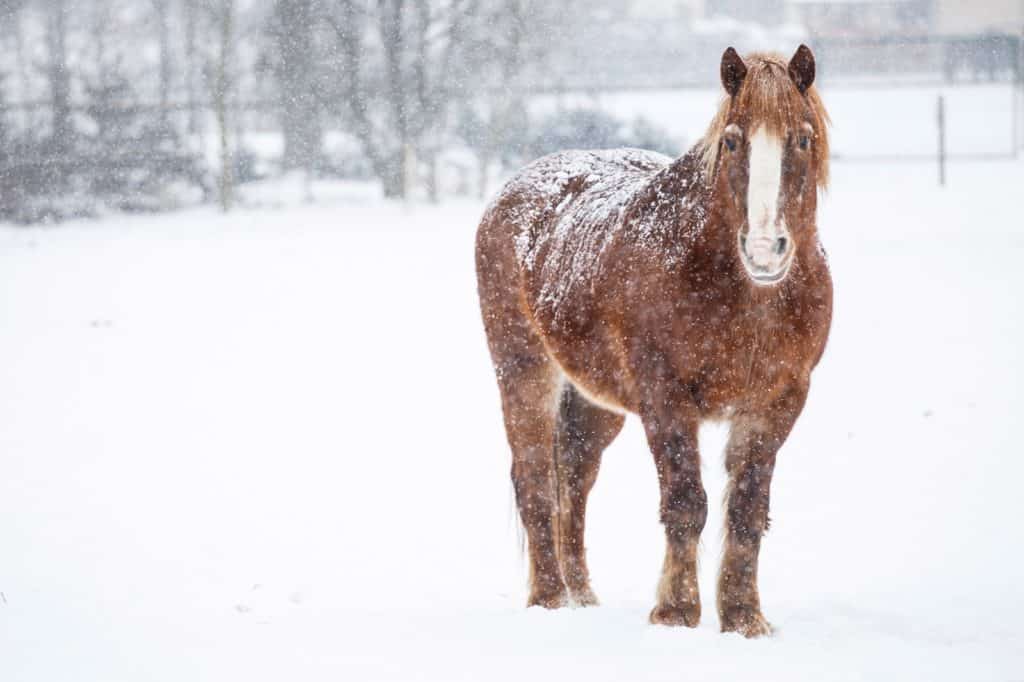Caring for Senior Horses in Cold Weather
- Topics: Article, Basic Care, Body Condition, Dental Problems, Diseases and Conditions, Eye & Ear Problems, Feeding Old Horses, Hoof Care, Horse Care, More Diseases & Conditions, Nutrition, Nutrition Basics, Older Horse Care Concerns, Other Eye Problems, Seasonal Care, Water & Electrolytes, Winter Care

Cold weather affects older horses more than it does their younger companions. But with knowledge and planning, your senior can stay comfortable and healthy, and getting through winter doesn’t have to be an ordeal.
Preseason Check Up
A pre-winter veterinary examination is a good way to get ready for cold weather. Your veterinarian can assess your horse’s weight and make specific recommendations for his nutritional needs. He or she can diagnose and address conditions such as Cushing’s disease, arthritis, heart murmurs, or heaves before the cold weather makes them more difficult to manage. It can be challenging for older horses to get around on frozen terrain due to arthritis, foot problems, or neurologic disease. Anti-inflammatory drugs as prescribed by your veterinarian can help make achy joints feel better in the cold weather. Keep feet trimmed properly, and pick them out regularly to help prevent snowball formation. If your horse wears shoes, consider asking your farrier to provide traction with borium. Make sure feed, hay, and water sources are easily accessible for horses with mobility issues. An often-overlooked condition in older horses is cataracts. The glare of the sun off the snow can make it difficult for affected horses to see, so consider putting a dark fly mask on them to help reduce the glare. Also have a thorough dental exam performed on horses before winter. Dental issues can impair their ability to chew hay and grain properly.
Water, Water, Water
Make sure older horses are drinking enough clean, warm, ice-free water during winter. Water is important for body temperature regulation and for digestion. Older horses that do not chew their grain or hay thoroughly may already be more prone to digestive disturbances, and insufficient water can lead to impaction colic. If you are uncertain about how much water your horse is consuming, add warm water to his grain to help ensure he gets a certain amount daily.
Feed for Warmth
Feed and the fat layer that results from it help keep your horse warm. Within minutes of eating a meal, the horse’s digestive processes begin to generate heat and warm the body. Over time, calories that aren’t immediately used are stored as fat that acts as insulation. Older horses are usually leaner, with less fat and thinner muscles, and they don’t utilize calories as well as younger horses.
The best way for a horse to produce heat is to eat hay. Most horses consume 2 percent of their body weight in hay per day. For a 1,000-pound horse, that’s 20 pounds of hay. In winter you’ll probably need to increase that amount. Providing hay at night will keep the “burning” process going. If your horse has dental issues that don’t allow him to chew hay well, offer an alternative forage such as soaked hay cubes or chopped, bagged hay products. It is often necessary to supplement an older horse’s diet with grain. If your horse normally gets grain, you might need to increase the amount in winter. Talk to your veterinarian or an equine nutritionist for advice on grain rations.
Blankets and Shelter
Harsh winds and cold rain can take their toll on older horses. Believe it or not, snow actually acts as an insulator, even when it’s inches deep on a horse’s back. Rain that mats hair and wind that blows the warm layer of insulating air are what cause problems. Offer some type of shelter so your horse can escape the wind and rain. If he is in a herd situation, make sure he’s not being bullied out of the shelter and that conditions such as ice, snow, or mud don’t make it impossible for him to get to it. It might be necessary to shovel a path and put down straw, hay, gravel, or shavings to make it a safe surface for walking.
An older horse in very good weight with a full coat and no health issues probably does not need a blanket. Any older horse that is thin going into winter or has health issues that may increase his caloric needs or decrease his ability to take in calories should be blanketed. Shivering is a sign he definitely needs a blanket. You can layer blankets according to how much warmth you think your horse needs.
The key, however, is to not let your horse get too warm. If he sweats under his blankets he will have a hard time drying off, will become chilled, and might start shivering. It is also very important to remove your horse’s blanket regularly to check for signs of rubs, skin disease, or weight loss. It is easy to overlook weight loss if you never see him without a blanket.
The Bottom Line
Older horses need a little extra care in winter. Help them maintain weight and keep warm with proper feeding and blanketing, along with good veterinary care.
Written by:
Sallie S. Hyman, VMD, Dipl. ACVIM, CVA
Related Articles
Stay on top of the most recent Horse Health news with















